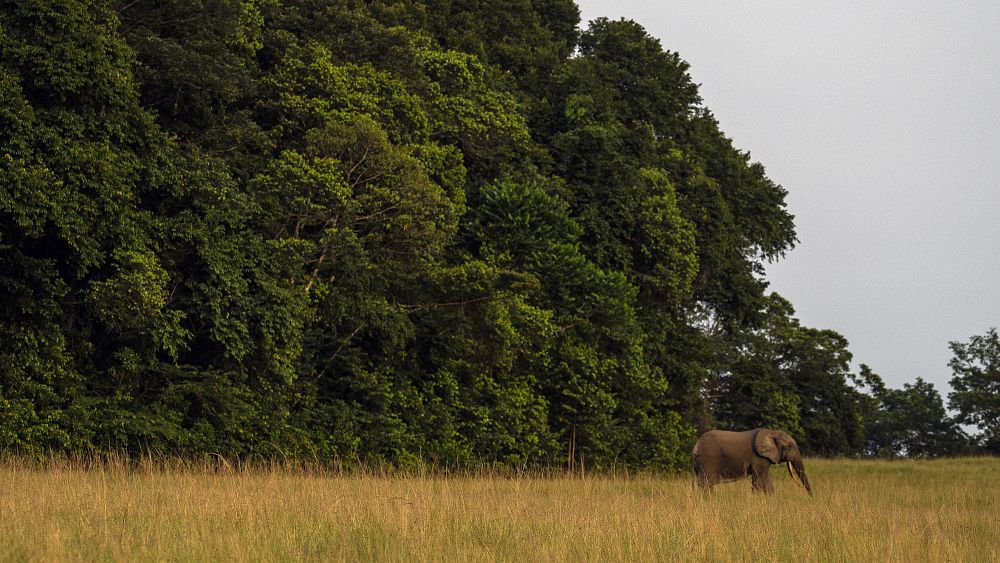Preservation of tropical forests at heart of Gabon’s One Forest Summit
4 min read

The African forest, the Congo Basin, is the largest tropical forest in the world after the Amazon, and spans six countries, including Gabon.
As well as being a treasure trove for biodiversity, forests like these act as the planet’s green lung, with the International Union for Conservation of Nature estimating that they absorb approximately 2.6 billion tonnes of carbon dioxide each year.
Preserving tropical forests is central to slowing the effects of climate change, yet despite this, large swathes of forest in the Amazon continue to be destroyed to make way for farm land.
The issue of tropical forest preservation was at the heart of the One Forest Summit, an international conference in Gabon’s capital Libreville, organised by the west-central African nation in collaboration with France.
Euronews correspondent Anne Devineaux went to Gabon to find out more for Focus.
One Forest Summit
French President Emmanuel Macron, and Gabonese President Ali Bongo announced this month’s One Forest Festival at the COP 27 climate conference in Sharm el-Sheikh in November last year.
The festival, which took place on the 1st and 2nd of March, sought to promote North-South solidarity when it comes to climate change, given the precarity of the global south as sea levels rise and extreme weather events become more frequent.
Building on previous One Planet Summits, politicians, international companies, scientists and NGOs gathered in Libreville to discuss the forestry sector, focusing on three key areas; advancing scientific cooperation, sustainability, and finance.
Gabon’s President, Ali Bongo Ondimba, had a clear message for those attending the conference: “There are no better investments today than investing in our forests”.
The second day of the festival honed in on the topic of the Congo basin and the common challenges faced by the African, Amazonian and Asian tropical forest basins, as such forests are huge absorbers of carbon dioxide, but these regions remain on the frontline of climate change.
Ecologist at CENAREST Gabon, Alfred Ngomanda told Euronews that “The Congo Basin represents 40 billion tons of sequestered CO2… It is 10 years of global greenhouse gas emissions that are currently stored in the forests of the Congo Basin. In Gabon, it is 100 million tons per year”.
The scientist stressed that African forests are at the forefront of the battle against climate change, with Gabon being one of the few countries in the world to absorb more CO2 than it emits.
Protecting rare species in Gabon
Lee White, Gabonese Minister of Forestry, Sea and Environment told Euronews that the country has documented the reduction of 90 million tons of CO2 emissions, figures which he said were validated in November 2022 during COP 27.
Gabon has put in place rigorous policies to defend the forests that cover 88 percent of its territory, granting ‘national park’ status to 13 areas 20 years ago to protect special flora and fauna.
The government has also made commitments to protect rare species, such as the Kevazingo tree in Pongara Park, which is an expensive and sought-after type of wood. Similarly, these parks provide a refuge for animals threatened by trafficking, for example forest elephants, giant pangolins and lowland gorillas.
A lack of resources, however, has left the door open to poachers.
Conservator of Pongara Park, Patrick Evezoo, said: “The biggest problem is poaching, poaching of elephants, poaching of plant species, those who cut wood illegally, and there is poaching of fish species at sea level… As in all the other parks, we need a lot of means to do our work well.”
Promoting a sustainable wood industry
Outside of the national parks, Gabon is also exploring more sustainable ways to use wood, to eliminate waste and cut down their carbon footprint.
Ten years ago, the country created the Nkok economic zone, an area which hosts around 100 companies, many of which are related to the forest industry. It has been officially certified as ‘carbon neutral, and is the home Central Africa’s first plant to manufacture chipboard from wood waste.
At the same time as Nkok was established, the country also banned the export of raw logs, instead meaning manufacturers had to transform wood into a product with higher added value.
Waris Moulenda Fatombi, from the Administrative Authority Nkok SEZ, said: “When this zone was launched, we used 40% wood. Today, we are able to use 90% of the logs through the valorization of waste.”
All timber that arrives in the Nkok economic zone goes through checks by a service called Tracer, to ensure it is legal.
An oil country
Despite these positive steps towards a greener future, Gabon’s economy still relies on oil, which could be a problem in the coming decades.
Lee White, Gabonese Minister of Forestry, Sea and Environment, told Euronews: “In Gabon, an oil country, in the next 20 years or so, because the G20 countries have filled the atmosphere with CO2, there will no longer be a market for our oil. We will be forced to replace 50% of our economy, with… with what? With something.”





